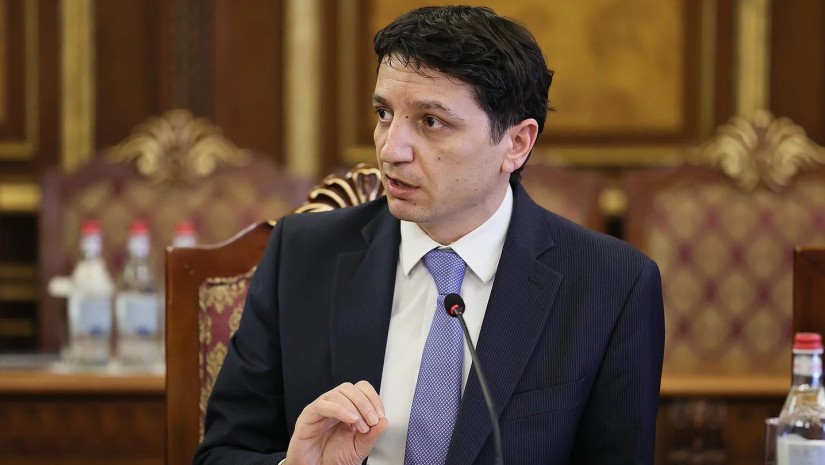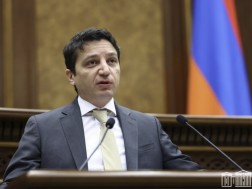Armenia's economic growth and development strategies focus on diversifying the economy, supporting local industries, and positioning the country as a high-tech hub and transport corridor. While there is potential for growth, concerns about currency fluctuations, debt levels, and reliance on exports remain. In an interview with BMG, Armenian Finance Minister Vahe Hovhannisyan emphasizes the need to balance economic growth with stability and sustainability.
Mr. Minister, in the first quarter of 2024, economic activity in Armenia increased by more than 14% compared to last year. Is this truly the result of the development of the Armenian economy, or is it growing faster than its real potential?
You are right. Our economy in the last few years has grown faster than its potential. Of course, the good news is that during this time, our potential has also increased. When we talk about the first quarter, first of all, we need to indicate that GDP growth was around 9%. But there is also a process of double-checking by the statistical committee. So, our estimation of the real growth is around 7.5%. We have to take into account all the flows, including the jewelry that is happening in our economy, and we have to filter in order to have a real understanding of what's happening in our economy.
Mr. Minister, the manufacturing industry, which grew by 31.1% in January-April 2024, continues to account for a significant portion of economic activity. This growth was "due to the expansion of production and export of gold jewelry." Do you believe that the Armenian economy is showing signs of the "Dutch disease," in other words, becoming more dependent on external factors?
Of course, our economy being small, is highly affected by external factors. And yes, there is a risk, but we have efforts to diversify our economy. While being dependent on external economies, we have to diversify these economies and decrease our dependency on only one economy. However, we all understand that we are part of the Eurasian Economic Union, and most of our trade flow naturally happens within the Eurasian Economic Union. However, increasing the productivity of our businesses and competitiveness of our private sector has no other alternative if we want to have long-lasting stable growth and avoid any turbulence that will occur with any external changes of any factors.
Mr. Minister, what is the government doing to uplift other sectors of the Armenian economy?
We have a big package of support for agriculture, to promote intensive agriculture in Armenia. I think in 2023, around more than 40 billion drams (more than $100 million) was provided to the sector. And we see that the volume of intensive orchards has increased. We have support for the IT sector and I hope very soon we will introduce a new package of support for the IT sector because, as you know, there is high competition in the world to attract and retain good quality IT professionals, and we would like to create all the necessary environment for global IT companies to be represented in Armenia and have good conditions for the employees to live here. We also provide attractive support for modernizing businesses. For example, we subsidize interest rates for leasing if any business would like to invest in new technologies. We subsidize IT procurement if anyone wants to increase productivity and efficiency by investing in digitalization and several other sectors. So, in different ways, by also improving our trade customs procedures, we would like to support our businesses to be more efficient in their trade and exports.
Mr. Minister, can you provide more details about the supporting project for the IT sector?
In fact, we have extended the support package that was in place until December 2023 for an additional year. We aim to create a more long-term support package after 2025. Currently, we are in the process of designing this package, which will include very generous benefits for research and development, as well as education investments. The current package assists startups by reducing their income tax rates and providing tax reductions to companies that have relocated from Russia or other countries to Armenia in recent years.
The Armenian economy is largely dependent on agriculture and industrial production. What are the other sectors that have the potential to finance the state budget?
Firstly, I must clarify that agriculture is not a major contributor to the state budget. The service sector is one of the biggest contributors, and it has been growing fast in recent years, encompassing not only IT but also the financial sector. This is very encouraging for us. Of course, the mining industry remains one of the biggest contributors to the state budget. As I mentioned, our goal is to attract high-quality investment in the production industry, diversify it, and increase the complexity of production in Armenia. To achieve this, we have implemented generous support measures for investors planning to produce higher complexity products in Armenia, offering cash back on investments of up to 35%.
What do you see as the competitive advantage of Armenia in the region in attracting investors?
I believe Armenia should position itself as a high-technology hub, as it was during the Soviet Union era, and provide innovative technological solutions not only in the region but globally. In recent years, we have seen positive signals in this direction, and we are actively discussing our participation in the Middle Corridor with our "Crossroads of Peace" initiative. I also think Armenia should support the overall region in becoming a transport corridor between Asia and Europe.
How significant is the share of re-export in Armenia's export structure, and is it a problem?
In 2023, re-exports accounted for 57% of our overall exports. I don't necessarily see this as a problem because, as I mentioned, if we aim to become a logistical and transport corridor between East and West, a significant portion of our future GDP will depend on trade. The question here is the sustainability of such re-exports. Therefore, we have planned special reserves to mitigate any risks that may arise in the future if these re-exports cease. It's important to note that we do not talk about re-exports of sanctioned items; all products are controlled by our customs and are not on the sanctions list.
Many economists have expressed concern about the economy, as in the first quarter of 2024, the largest taxpayer in Armenia became a company engaged in the import and sale of mobile phones and accessories. Do you agree with them? Is this bad news for the Armenian economy?
No, I don't believe it's bad news. Firstly, it's premature to make judgments based on just one quarter. Secondly, we need to consider what's happening with the rest of the taxpayers. Perhaps there are opportunistic businesses paying taxes, which is positive. We have seen an increase in our tax revenues, and there hasn't been a reduction elsewhere. I think our main attention should be on industry, and how we can support them in this situation where our currency is evaluating and supporting those areas of our economy, which provide long-term growth potential. From this perspective, I don't see a significant issue with businesses taking advantage of the current situation to maximize profits. It's a natural occurrence, and I hope that businesses in various sectors will have the flexibility to capitalize on any opportunities to generate additional revenue.
Considering the current high pace of economic activity, what is the Ministry of Finance of Armenia's forecast for economic growth at the end of 2024?
Generally, at the Ministry of Finance, we develop various scenarios for economic growth. As you know, we have a targeted 7% growth within our budget, and we typically advise the government on what actions should be taken to achieve this target. Recently, we conducted an analysis, and of course, as I mentioned, we have different scenarios. However, based on the current scenario, which we consider the most probable, though many things can change throughout the year, we anticipate it to be around 7%, perhaps slightly below.
How manageable is Armenia's public debt, and how much is it expected to increase by the end of 2024?
As you are aware, we have achieved remarkable results in the last few years. In just two years, we decreased our debt from 63% to 47%. Another positive outcome is that we managed to increase the share of our Armenian-denominated debt, which is now slightly below 50%. This places our debt at a very sustainable level, and the recent changes in our rating by rating agencies are indicators of that. We are confident that by the end of the year, we will maintain the level of our government debt below 50%.
Armenia and Georgia are among the most important trade partners for each other. In terms of customs procedures, are there any challenges that you are working together to overcome?
The Ministry of Finance is not actively involved in these discussions, but I am aware that our colleagues at the State Revenue Committee (SRC) are working closely with the Ministry of Finance of Georgia. Just as in Georgia, the Ministry of Finance in Armenia is also responsible for customs and tax matters. We are synchronizing our efforts in many areas to ensure smooth operations. I would also like to highlight the excellent cooperation between the Ministry of Finance of Armenia and the Ministry of Finance of Georgia. It has become a tradition for us to meet every year to discuss our fiscal policies and forecasts for the future, learning from each other. Our colleagues exchange policies and insights, which I believe is a very positive step towards broader regional cooperation. We met last year in Armenia, and we are now planning our next meeting for the summer.
















